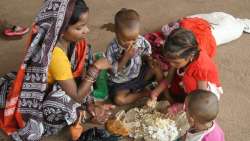India TV-CNX Opinion Poll: 42% voters in UP think economic issues bigger factor than IAF strike
The survey found that while 42.02 per cent voters thought economic issues will be most important while voting in upcoming Lok Sabha elections, 24.35 per cent opined that Pulwama terror attack and its aftermath would affect their decision.

More voters in Uttar Pradesh give precedence to economic matters over terrorism while voting, India TV-CNX survey has found. The first survey conducted after the Pulwama terror attack and IAF strike on Jaish-e-Mohammed camps in Pakistan, the opinion poll survey says that economic issues continue to dominate voters' agenda.
The survey found that while 42.02 per cent voters thought economic issues will be most important while voting in upcoming Lok Sabha elections, 24.35 per cent opined that Pulwama terror attack and its aftermath would affect their decision.
Also read | NDA may gain 12 more seats in UP post-air strike, says India TV-CNX survey
Corruption, which dominated the 2014 poll battle has been relegated to the third spot as only 08.47 per cent respondents in the India TV-CNX survey said that it was a decisive factor while voting. Around seven per cent each thought religious issues and other issues will be more crucial than all above. Around 10 per cent had no opinion.
What will be the most important issue for you when you vote in the coming Lok Sabha election 2019?
| Options | % of Survey Results |
| Economic Issues | 42.02 |
| Terrorism/Pulwama Attack | 24.35 |
| Corruption | 08.47 |
| Religious Issue | 07.65 |
| Others | 07.10 |
| No Opinion | 10.41 |
Also read | 62% say war is only solution Indo-Pak problem: India TV-CNX Opinion Poll
Interestingly, only 32.05 per cent respondents to the survey said that India's airstrike on Pakistan would affect their choice of Parliamentary representative. Around 40 per cent felt otherwise and around 27 per cent gave no opinion.
If you have heard about the recent Air strike by India in Pakistan, Please tell me how it will affect your decision of whom to vote?
| Options | % of Survey Results |
| A lot | 32.05 |
| Not very Much | 40.65 |
| Can't Say | 27.30 |
IndiaTV-CNX Opinion Poll: How the survey was conducted
IndiaTV-CNX Opinion Poll was conducted in 27 Parliamentary Constituencies of Uttar Pradesh between March 1-3. The respondents were selected randomly from 20 polling stations in each constituency. On the whole, the sample respondents came from all walks of life. 2923 were male respondents, while 2477 were female. The results are subject to a margin of error 2.5 per cent.